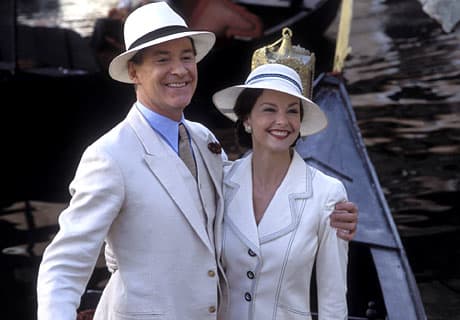Having composed some of the most ubiquitous songs of the last century, Cole Porter is best known as a songwriting credit, but his elegant, adventurous and semi-tragic life was more dramatic than the hokey movie plots his tunes often accompanied. One such film was the 1946 Porter biopic Night and Day starring Cary Grant, whose atypical awkwardness might have sprung from the fact that he was a closeted bisexual playing a closeted bisexual in a closeted film. Despite its share of Behind The Music clichés, De-Lovely is undoubtedly "the tops" next to its predecessor, with Kevin Kline delivering a superb balance of style and substance. The story revolves around the one-sidedly open marriage of Porter and his muse Linda (Ashley Judd), following the couple as the composer's career rose and fell, from lavish locales in Europe to Broadway to Hollywood to a depressing retirement. Interwoven throughout are performances of Porter's music, sequenced and occasionally altered to match the unfolding drama, from his gay parties ("Let's Misbehave") to his wife's death ("Every Time We Say Goodbye"). Only two songs are given the unpopular spontaneous song'n'dance treatment, but clearly neither live up to the likes of Fred Astaire and Ginger Rogers' "Night and Day" (The Gay Divorcée) or Astaire and Eleanor Powell's "Begin the Beguine" (Broadway Melody of 1940). Apart from Diana Krall's bitchy deadpan and the wounded-animal emissions of Alanis Morissette, the film's star singers (Robbie Williams, Elvis Costello, etc.) interpret the classics well. However, many of the songs are left to Kline, who underperforms to match Porter's mediocre voice, heard over the closing credits. On the special features front, Winkler teams up with Kline and scriptwriter Jay Cocks in two feature-length commentaries (Kline narrowly outdoes Cocks), along with standard but solid "making of" featurettes and "anatomy of a scene" segments. (MGM)
De-Lovely
Irwin Winkler

BY Lorraine CarpenterPublished Dec 1, 2004